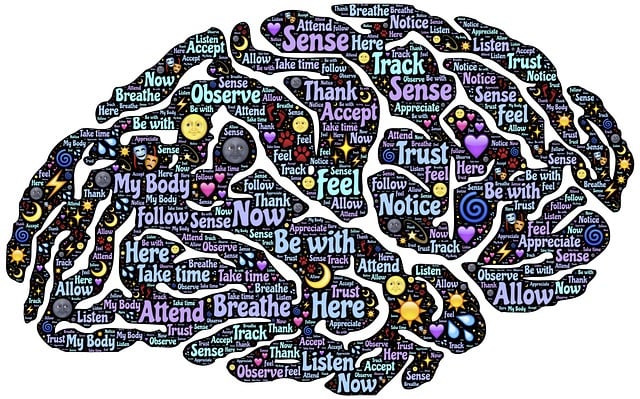Emotional Intelligence (EQ) is a powerful tool for navigating life's complexities, especially for those with conditions like Centennial Obsessive Compulsive Disorder (OCD). EQ involves recognizing and managing emotions, understanding others' feelings, and effective communication—crucial skills for building relationships and making positive decisions. Mindfulness Meditation and Self-Awareness Exercises enhance EQ, helping individuals navigate social situations gracefully. Community Outreach Programs foster a sense of belonging, improving life satisfaction. Integrating these practices, individuals can transform their lives, overcoming OCD challenges to cultivate resilience. Identifying and managing emotions through techniques like mindfulness and cognitive reframing is key. Empathy, fostered through therapy's safe environments, aids in accurate risk assessment and promotes mental health awareness. Cognitive Behavioral Therapy (CBT) and Social Skills Training help develop resilience and adaptability, with self-care routines contributing significantly to mental well-being.
Emotional intelligence (EI) is a powerful tool for navigating personal and professional life, enabling individuals to understand and manage their emotions effectively. This article explores the profound impact of EI, providing practical strategies for development. We delve into identifying and regulating emotions, emphasizing empathy as a catalyst for improvement, and discussing resilience as a key adaptive skill. By understanding these concepts, readers can enhance their mental well-being, foster better relationships, and thrive in today’s dynamic world, even managing conditions like Centennial Obsessive Compulsive Disorder (OCD) Therapy with improved emotional control.
- Understanding Emotional Intelligence and Its Significance
- Identifying and Managing Emotions: A Step-by-Step Guide
- The Role of Empathy in Enhancing Emotional Intelligence
- Strategies for Developing Resilience and Adaptability
Understanding Emotional Intelligence and Its Significance

Emotional intelligence (EQ) is a powerful concept that has gained significant attention in recent years, not only in psychology but also in various sectors of society. It refers to an individual’s ability to recognize and manage their own emotions and understand and empathize with others’ feelings. This skill set goes beyond mere emotional awareness; it involves effective communication, strong interpersonal relationships, and the capacity for positive decision-making. For individuals struggling with conditions like Centennial Obsessive Compulsive Disorder (OCD) Therapy, EQ can be a game-changer.
The significance of emotional intelligence cannot be overstated, especially in today’s fast-paced and often stressful world. Mindfulness Meditation and Self-Awareness Exercises are proven to enhance EQ, enabling individuals to navigate complex social situations with grace and understanding. Moreover, Community Outreach Program Implementation can foster a sense of belonging and connection, contributing to improved emotional well-being and overall life satisfaction. By embracing these practices, folks can transform their lives, breaking free from the labyrinthine patterns of OCD and cultivating resilience in the face of life’s challenges.
Identifying and Managing Emotions: A Step-by-Step Guide

Identifying and managing emotions is a cornerstone of emotional intelligence development. The first step involves recognizing and labeling feelings accurately. This might seem simple, but differentiating between similar emotions like frustration and anger is crucial. Centential Obsessive Compulsive Disorder (OCD) Therapy provides valuable tools for this, helping individuals develop a nuanced understanding of their emotional landscape. Once emotions are identified, it’s important to explore the root causes—why do certain situations evoke specific feelings? This introspection allows for more targeted emotion regulation strategies. Techniques like mindfulness and deep breathing can help calm intense emotions, while cognitive reframing enables individuals to view challenging situations from different perspectives.
The next step is to express emotions healthily. Suppression often leads to burnout, which is a significant concern among healthcare providers—a demographic that benefits greatly from learning effective emotional management techniques, including Social Skills Training. Open communication, whether through words or creative outlets like art, can help release pent-up feelings. Additionally, setting boundaries is essential for maintaining emotional well-being and preventing depression. By learning to recognize triggers and employ appropriate coping mechanisms, individuals can better navigate their emotional experiences, fostering more fulfilling relationships and improving overall mental health.
The Role of Empathy in Enhancing Emotional Intelligence

Empathy plays a pivotal role in enhancing emotional intelligence (EI). It’s a cornerstone that allows individuals to understand and share the feelings of others, fostering deeper connections and more nuanced interactions. In the context of Centennial Obsessive Compulsive Disorder (OCD) therapy, empathy becomes an indispensable tool for mental health professionals. By employing Emotional Well-being Promotion Techniques, therapists can create a safe and supportive environment where clients feel heard and validated, encouraging open communication about their struggles. This not only aids in accurate risk assessment for OCD but also promotes Mental Health Awareness, enabling individuals to better manage their conditions.
Through active listening and genuine concern, empathy facilitates the development of EI skills. It helps individuals recognize and appreciate the emotional experiences of others, leading to improved social interactions and stronger relationships. Moreover, by cultivating empathy, mental health professionals can navigate complex situations with greater sensitivity, making them more effective in supporting clients on their journey towards better emotional well-being.
Strategies for Developing Resilience and Adaptability

Developing resilience and adaptability is a crucial aspect of emotional intelligence growth. This involves cultivating strategies to navigate life’s challenges and uncertainties with grace. One effective method is Cognitive Behavioral Therapy (CBT), which helps individuals challenge negative thought patterns and replace them with more adaptive ones. CBT, especially tailored for those dealing with conditions like Obsessive-Compulsive Disorder (OCD), offers valuable tools for managing moods and reducing anxiety. By learning to recognize and modify unhelpful cognitive processes, people can enhance their emotional resilience and adaptability.
Building social skills is another key component. Social Skills Training equips individuals with the ability to connect, communicate, and collaborate effectively. This includes practicing active listening, empathy, and assertiveness, which are essential for fostering healthy relationships. Additionally, establishing a consistent self-care routine contributes significantly to mental well-being. Incorporating activities like regular exercise, mindfulness practices, and engaging hobbies supports mood management and cultivates a sense of stability, thereby strengthening adaptability in various aspects of life.
Emotional intelligence is a powerful tool for personal growth and relationship building. By understanding, identifying, and managing our emotions effectively, we can enhance our empathy, build resilience, and adapt to life’s challenges with greater ease. The strategies outlined in this article—from step-by-step emotion management techniques to fostering empathy—are designed to help individuals navigate their feelings, improve communication, and ultimately lead happier, more fulfilling lives. Incorporating these practices into daily routines can revolutionize how we interact with others and tackle life’s complexities, making emotional intelligence a valuable asset for personal development and well-being in the modern world.







